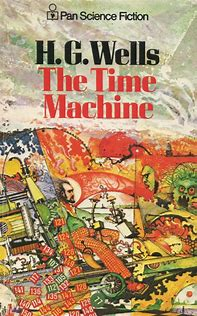Thinking about time travel, we have to think about time. The Time Machine begins with a discussion of "Time." I am trying to work back to the Time Patrol but this might take some time.
The present moment does not move along time. Motion through space takes time. Nothing moves through time. "The passage of time" is a meaningful expression but does not refer to literal motion. Every moment is the present to any organism that is conscious in that moment. Thus, the present is relative, not absolute. Also, any object that is perceived by an organism is present to that organism. Two meanings of "present" connect. Our present is what is present to us.
There was no present before consciousness. Before the first moment of consciousness, there were many moments but none of them was present to anyone.
An "eternal present" would have to mean a timeless consciousness whereas self-consciousness involves consciousness of the self as a temporally enduring subject. Does it make sense to talk about an eternal present with events moving through it? Metaphorically, maybe. Literally, no. Motion of events would take time.
Events that are known to have happened are classified as past. However, in that sense, the future history of the Danellians and the Time Patrol as taught at the Patrol Academy in the Oligocene is past! Maybe it should be said that it is known that this history will happen? More accurately, it is known that this history will happen if it is not prevented from happening. The Patrol concept of time must be completely different from ours.
I am running out of time this evening.

8 comments:
Kaor, Paul!
And all time (past, present, future) is known to God from all eternity.
Speaking of time, over the past two weeks I've been reading, at different times, Oscar Wilde's THE PICTURE OF DORIAN GREY, Anderson's THE BYWORLDER, and JRR Tolkien's THE NATURE OF MIDDLE EARTH (ed. by Carl F. Hostetter. All three have been read, just in time for me to hopefully soon get a copy of Stirling's TO TURN THE TIDE!
I asked Barnes & Noble to reserve a copy for me.
Rereading THE BYWORLDER has been useful. I came across important passages in both PA's introduction for the Gregg Press edition and the novel which I decided needed to be copied into Vol. 2 of my CODEX ANDERSONIANUS.
Ad astra! Sean
Motion through time is -temporal- motion, not physical. Temporal motion exists and is continuous.
I don't put it that way. I suggest that physical bodies extend and move through space and endure through time. Thus:
a spatial distance: 60 miles;
a temporal interval: 60 minutes (= 1 hour);
motion involves both, e.g., 60 mph.
Apparently, calculus is the branch of mathematics that deals with motion and speed, i.e., with one quantity changing in relation to another. However, I was never introduced to calculus at school. I had to realise for myself that "60 minutes per hour" is not a speed because 60 minutes IS an hour. For motion, two sets of quantities are necessary.
Kaor, Paul!
I lean more to how Stirling stated it. The dashboard of my car has a speed meter, telling me how far I will go at a stated speed. If I wanted to go 40 miles in one hour, drive at the speed where the meter says "40 mph."
Ad astra! Sean
Sean,
Yes. You can travel 40 miles (through space) in 1 hour (time). But you do not travel through 60 minutes (time) in 1 hour (time). You simply exist/live/endure through 60 minutes = 1 hour (time).
Paul.
However, you will experience the hour of time regardless of whether you drive or stay sitting or go to sleep.
However, time is not uniform; it just seems so from our viewpoint.
If you approach lightspeed, your physical displacement affects duration. You experience much less duration than those not at a similar velocity.
So physical speed affects the duration of the object.
That is true. I don't think that it affects the original point.
Kaor, to Both!
Trying to make sense of "time" is surprisingly difficult. And it gets weird when you factor in what happens if you travel at a speed close to that of light. I've thought of stories by Anderson touching on that: TAU ZERO and STARFARERS.
Ad astra! Sean
Post a Comment